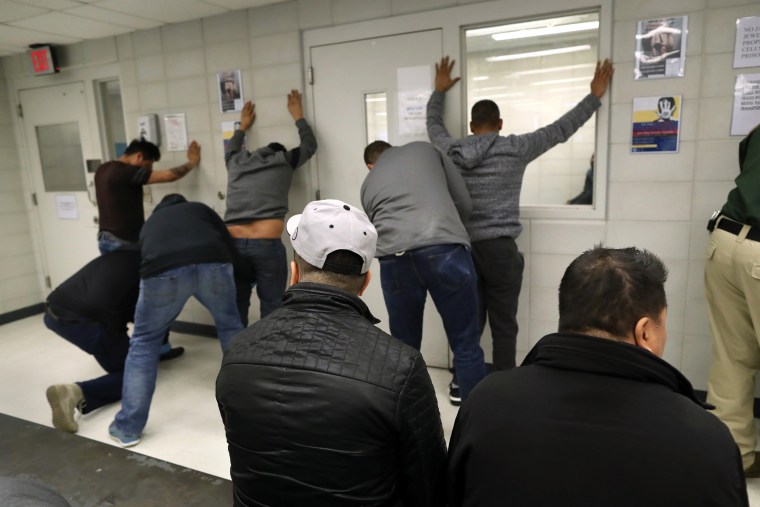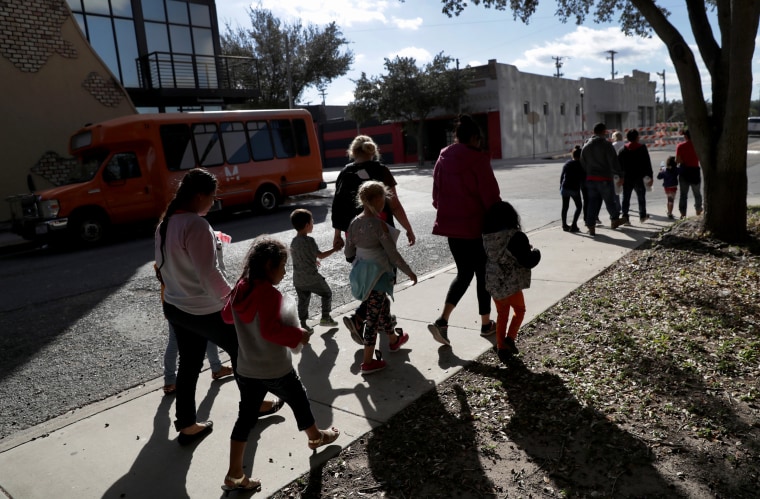WASHINGTON — Talks to avert another government shutdown broke down over the weekend — this time over Democrats' demand for a cap on the number of undocumented immigrants who can be detained by Immigration and Customs Enforcement (ICE).
The issue has reared its head because the White House has asked for $4.2 billion for ICE to increase its capacity to detain immigrants to 52,000, up from 40,000 currently funded by Congress. Democrats want to cap the detention space ICE can use to hold immigrants in the interior of the country — away from the border — at 16,500.
Here's a look at what's driving both sides to their positions.
Why does ICE need more space?
Currently, ICE is already holding more immigrants than Congress has authorized. Although it is only authorized to hold 40,000, there were 49,057 immigrants in ICE detention as of Feb. 6, according to the Senate Appropriations Committee. An ICE spokeswoman said the average daily population for this year as of Jan. 26 was 45,671.
When ICE does not have funding for space, they may take funds from other areas or use contracts with prisons to find additional beds for immigrants.
In the interior of the country, where Democrats would like to see a limit of 16,500 immigrants in detention, there are approximately 20,800 migrants being held, according to an ICE official authorized to speak on the subject.
Who are these immigrants in ICE detention?
President Donald Trump has repeatedly said ICE is holding dangerous criminals, including murderers. While ICE held immigrants in fiscal year 2018 who collectively were convicted on 54,630 charges, only 1,641 of the charges were homicide. The most frequent charges were for driving under the influence, followed by drug offenses, traffic offenses and immigration offenses (such as re-entering the country after a deportation order.)

Why are noncriminal or nonviolent immigrants in ICE detention?
Under President Barack Obama, ICE was told to prioritize immigrants convicted of serious crimes and those who posed threats to national security. As a result, in fiscal year 2016, 98 percent of immigrants arrested in the United States fit those priorities.
Trump changed that practice, making every immigrant in the country illegally a priority for arrest and deportation by ICE. As a result, in fiscal year 2018, 20 percent of immigrants arrested by ICE had no criminal conviction.
The ICE official told NBC News that 89 percent of immigrants currently being held in detention have been convicted or charged with crimes.
Criminal immigrants in ICE detention have served their time in the U.S. penal system and are awaiting deportation.
Why do Democrats want a cap?
After high-profile deportations and raids by ICE, including arrests at courthouses and deportations of military spouses, some Democrats began calling for ICE to be abolished.
Democrats on the conference committee negotiating the budget have pushed for ICE to cap its detention space so that noncriminals will be left out of ICE enforcement operations.
Rep. Lucille Roybal-Allard, a Democrat from California and a member of the conference committee, said in a statement, "A cap on ICE detention beds will force the Trump administration to prioritize deportation for criminals and people who pose real security threats, not law-abiding immigrants who are contributing to our country."
A Democratic aide who reviewed the White House's January budget request said the proposal "continues to assume that the only approach to handling recent border crossers is detention. This is also an historically high number of beds to maintain and could be used as a 'bail out' for ICE, which has been consistently operating well over its appropriated levels for detention space in the past few years."


